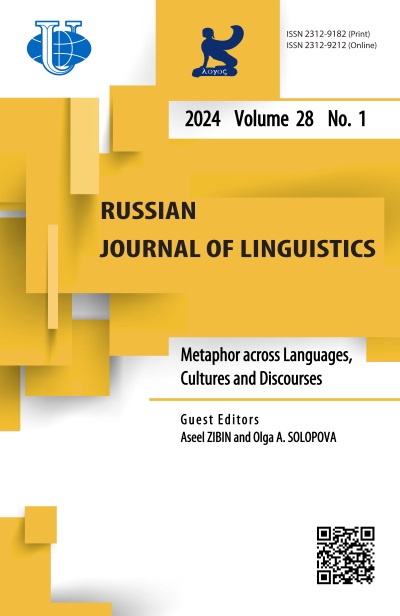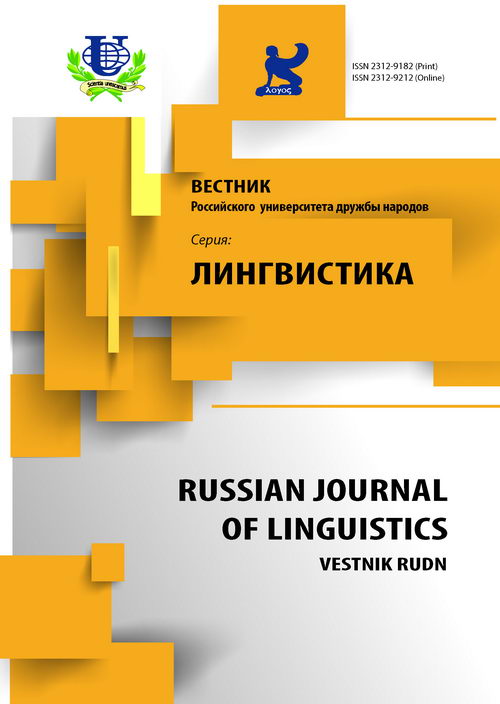Facework in Non-Face-Threatening Emails by Native and Non-Native English Speakers
- Authors: Eslami Zohreh R -1, Wei-Hong KO -1
-
Affiliations:
- Texas A&M University
- Issue: Vol 19, No 4 (2015)
- Pages: 111-126
- Section: Articles
- URL: https://journals.rudn.ru/linguistics/article/view/9262
Cite item
Full Text
Abstract
The aim of this research is to investigate the speech act of assignment submission and presence of facework in submission emails sent to faculty members by native and nonnative English speaking graduate students. Brown and Levinson’s politeness theory (1987) and Spencer-Oatey’s (2002, 2008) rapport management framework were utilized to analyze the emails. The corpus consisted of 105 emails from 40 NES and NNES students. Drawing on speech event analysis approach (Merrison, Wilson, Davies, & Haugh, 2012), we analyze both submission head act as well as optional elements like openings, small talk and closings in an email. Our exploratory study revealed that, contrary to the argument that CMC is a lean medium (Duthler, 2006) in which it is difficult to achieve interpersonal communication, through the employment of opening, small talk and closing strategies, students attended to relational goals in their email communication.
About the authors
- Eslami Zohreh R
Texas A&M University
Email: zeslami@tamu.edu
College of Education Department of Teaching, Learning, and Culture
- Wei-Hong KO
Texas A&M University
Email: shaun37@tamu.edu
College of Education Department of Teaching, Learning, and Culture
References
- Androutsopoulos, J. (2006). Introduction: Sociolinguistics and computer-mediated communication. Journal of Sociolinguistics, 10, 419-438. doi: 10.1111/j.1467-9841.2006.00286.x.
- Bayraktaroglu, A. (1991). Politeness and interactional imbalance. International Journal of the Sociology of Language, 92, 5-34.
- Bickmore, T., & Cassell, J. (1999). Small talk and conversational storytelling in embodied interface agents. In Proceedings of the AAAI Fall Symposium on Narrative Intelligence.
- Biesenbach-Lucas, S. (2007). Students writing emails to faculty: An examination of e-politeness among native and non-native speakers of English. Language Learning & Technology, 11, 59-81.
- Bjorge, A.K. (2007). Power distance in English lingua franca email communication1. International Journal of Applied Linguistics, 17, 60-80.
- Bou-Franch, P. (2006). Solidarity and deference in computer-mediated communication: A discourse-pragmatic analysis of students’ emails to lecturers. In P. Bou-Franch (Ed.), Ways into discourse (pp. 61-79). Granada, Spain: Comares.
- Bou-Franch, P., & Lorenzo-Dus, N. (2008). Natural versus elicited data in cross-cultural speech act realisation: The case of requests in peninsular Spanish and British English. Spanish in Context, 5, 246-277.
- Bou-Franch, P. (2011). Openings and closings in Spanish email conversations. Journal of Pragmatics, 43, 1772-1785.
- Brown, P., & Levinson, S.C. (1987). Politeness: Some universals in language usage Cambridge University Press.
- Chalak, A., Eslami, Z. & Eslami-Rasekh, A. (2010). Communication strategies and topics in e-mail interactions between Iranian students and their instructors. International Journal of Language Studies, 4, 373-391.
- Chen, C. (2006). The development of e-mail literacy: From writing to peers to writing to authority figures. Language Learning & Technology, 10, 35-55.
- Crystal, D. (2001). Language and the Internet. Cambridge, England: Cambridge University Press.
- Darics, E. (2010). Politeness in computer-mediated discourse of a virtual team. Journal of Politeness Research, 6, 129-150. doi: 10.1515/jplr.2010.007.
- Duthler, K.W. (2006). The politeness of requests made via email and voicemail: Support for the hyperpersonal model. Journal of Computer-Mediated Communication, 11, 500-521. doi: 10.1111/j.1083-6101.2006.00024.x.
- Economidou-Kogetsidis, M. (2011). “Please answer me as soon as possible”: Pragmatic failure in non-native speakers’ e-mail requests to faculty. Journal of Pragmatics, 43, 3193-3215. doi: http://dx.doi.org/10.1016/j.pragma.2011.06.006.
- Felix-Bradsdefer, J.C. (2012). E-mail requests to faculty: E-politeness and internal modification. In H. Woodfield & M. Economidou-Kogetsidis (Eds.), Interlanguage request modification (pp. 87-118). Amsterdam: John Benjamins Publishing Company.
- Formentelli, M. (2009). Address strategies in a British academic setting. Pragmatics, 19, 179-96.
- Islami, Z.R. (2005). Invitations in Persian: Ostensible or genuine? Intercultural Pragmatics Journal, 2(4),453-480. doi: 10.1515/iprg.2005.2.4.453.
- Eslami, Z.R. (2013). Online communication and students’ pragmatic choices in English. Lodz Papers in Pragmatics, 9, 71-92.
- Gains, J. (1999). Electronic Mail-A new style of communication or just a new medium?: An investigation into the text features of E-mail. English for Specific Purposes, 18, 81-101. doi: http://dx.doi.org/10.1016/S0889-4906(97)00051-3.
- Gimenez, J. (2006). Embedded business emails: Meeting new demands in international business communication. English for Specific Purposes, 25, 154-172. doi: http://dx.doi.org/10.1016/ j.esp.2005.04.005.
- Gimenez, J.C. (2000). Business e-mail communication: Some emerging tendencies in register. English for Specific Purposes, 19, 237-251. doi: http://dx.doi.org/10.1016/S0889-4906(98)00030-1.
- Goffman, E. (1967). Interaction ritual: Essays on face-to-face behavior. New York, NY: Anchor Books.
- Gu, Y. (1990). Politeness phenomena in modern Chinese. Journal of Pragmatics, 14, 237-257. doi: http://dx.doi.org/10.1016/0378-2166(90)90082-O.
- Harrison, S. (2000). Maintaining the virtual community: Use of politeness strategies in an e-mail discussion group. In L. Pemberton & S. Shurville (Eds.), Words on the web: Computer mediated communication (pp. 69-78). Exter, UK: Intellect.
- Hartford, B., & Bardovi-Harlig, K. (1996). "At your earliest convenience:' A study of written student requests to faculty. In L. Bouton (Ed.), Pragmatics and Language Learning (pp. 55-69), Urbana Champaign, IN.
- Herring, S. (1996). Two variants of an electronic message schema. In S. Herring Ed.), Computer-Mediated Communication: Linguistic, Social and Cross-Cultural Perspectives (pp. 81-106). Amsterdam, Netherlands: John Benjamins.
- Herring, S. 2007. A faceted classification scheme for computer-mediated discourse. Language@internet.
- Hossjer, E. (2013). Small talk, politeness and email communication in the workplace. In S. Herring, D. Stein & T. Virtanen (Eds.), Pragmatics of computer-mediated communication. Boston, MA: de Gruyter Mouton.
- Hofstede, G. (2001). Culture’s consequences: International differences in work-related values. Beverly Hills, CA: Sage.
- Jessmer, S., & Anderson, D. (2001). The effect of politeness and grammar on user perceptions of electronic mail. North American Journal of Psychology, 3, 331-345.
- Kiesler, S., & Sproull, L. (1992). Group decision making and communication technology. Organizational Behavior and Human Decision Processes, 52, 96-123. doi: http://dx.doi.org/ 10.1016/0749-5978(92)90047-B.
- Larina, T. (2005). Cultural values and negative politeness in English and Russian. Respectus Philologicus (Respectus Philologicus), 8, 25-39. www.ceeol.com.
- Larina, T. (2015). Culture specific communication styles as a framework for interpreting linguistic and cultural idiosyncrasies. International Review of Pragmatics. 7, 195-215.
- Locher, M., & Watts, R.J. (2005). Politeness theory and relational work. Journal of Politeness Research, 1, 9-33. doi: 10.1515/jplr.2005.1.1.9.
- Lorenzo-Dus, N., & Bou-Franch, P. (2013). A cross-cultural investigation of email communication in Peninsular Spanish and British English: The role of (in) formality and (in) directness. Pragmatics & Society, 4, 1-25.
- Matsumoto, Y. (1988). Reexamination of the universality of face: Politeness phenomena in Japanese. Journal of Pragmatics, 12, 403-426. doi: http://dx.doi.org/10.1016/0378-2166(88)90003-3.
- Merrison, A.J., Wilson, J.J., Davies, B.L., & Haugh, M. (2012). Getting stuff done: Comparing e-mail requests from students in higher education in Britain and Australia. Journal of Pragmatics, 44, 1077-1098.
- Pullin, P. (2010). Small talk, rapport, and international communicative competence lessons to learn from BELF. Journal of Business Communication, 47, 455-476.
- Spencer-Oatey, H. (2002). Managing rapport in talk: Using rapport sensitive incidents to explore the motivational concerns underlying the management of relations. Journal of Pragmatics, 34, 529-545.
- Spencer-Oatey, H. (2008). Face. Impoliteness and rapport. In H. Spencer-Oatey (Ed.), Culturally speaking: Culture, communication and politeness theory (2 ed., pp. 11-47). New York, NY: Continuum.
- Vinagre M. (2008). Politeness strategies in collaborative e-mail exchanges. Computers &Education, 50, 1022-1036. doi: 10.1016/j.compedu.2006.10.002.
- Waldvogel, J. (2007). Greetings and closings in workplace email. Journal of Computer Mediated Communication, 12, 456-477.

















